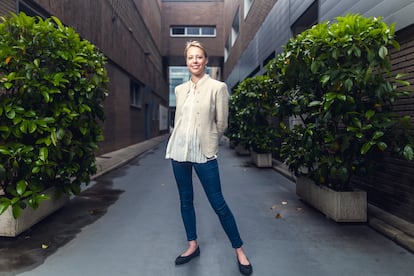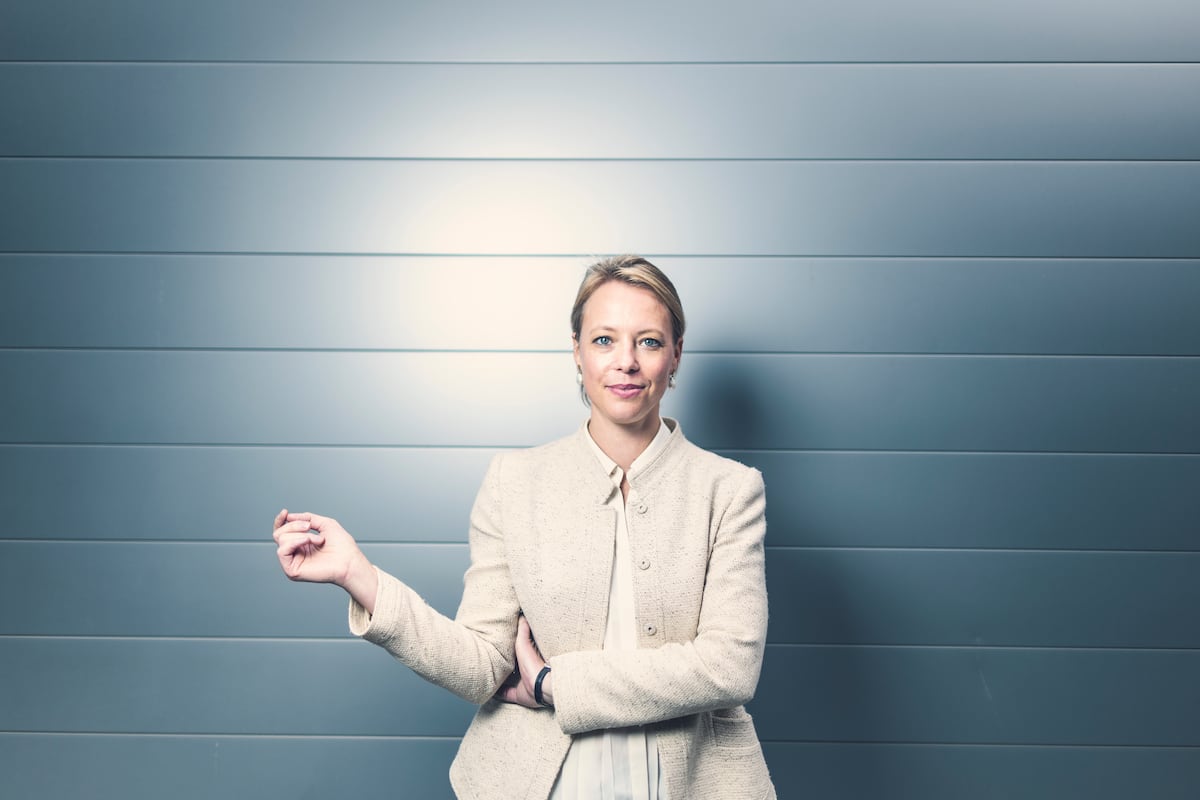Polarization isn’t a biblical curse. The fact that public debate has become so aggressive and toxic wasn’t always the inevitable fate of 21st-century societies. Within the EU, some people are working to defuse tensions, restore serenity, and reestablish a dialogue that seems impossible today.
Erika Staël von Holstein, 41, has been advising European institutions on science, technology, society, and democracy for two decades. She’s the founder and director of Re-Imagine Europe, a think tank focused on depolarization. The Stockholm-born advisor has also promoted Nodes.eu, a European observatory of narratives against disinformation.
Von Holstein is a member of the expert council on artificial intelligence convened by the Spanish government. This work brought her to Madrid, where she met with EL PAÍS.
Question. Combating disinformation is exhausting, isn’t it?
Answer. It’s quite exhausting. It’s getting harder and harder. I think the way that we communicate is becoming harder, too, because we’re retrenching into our own echo chambers and our own narrative communities. We’re forgetting how to speak to people [from] different communities.
Q. Polarization has led us to a wave of lies, hate speech, culture wars, and online rage. How do we depolarize society?
A. Polarization and disinformation are highly connected. Polarization fuels disinformation and disinformation fuels polarization. Instead of trying to convince people who have a different opinion to us, [if we] started to listen instead, we would quickly change [society], because the emotions that are currently driving a lot of this polarization are fear for the future, anger about today, and nostalgia about the past.
Q. Why are so many people attracted to extremism?
A. My biggest worry is actually not so much that there’s a big cultural shift — which, of course, there is and that’s worrying — but what’s causing that cultural shift. Because [extremism] isn’t about climate or vaccines or migration: these are just symbols for much deeper fears and resentments.
Q. Young people are becoming the most radicalized. You can see this in their views on feminism, the LGBTQ+ community, or the green transition. Polls show growing support for the far-right among that age group. What’s happening?
A. This is the case across Europe, although [there are] large differences between men and women (with women being less susceptible). It’s not difficult to understand: young people are having such a hard time finding housing or a job […] they see the future as increasingly bleak. The [past] era in which one could support an entire family on a single salary has been romanticized.
Q. The extremists are having great success in imposing their agenda.
A. They’re extraordinarily successful and they use insights from how the brain works much more effectively than what you would call the “traditional players.” Just remember what [neuroscientist] Antonio Damasio always reminds us of: we aren’t rational beings who feel… we are emotional beings who think. Emotion comes first. And, right now, we’re living in very, very emotional times where, unfortunately, there’s a lot of distrust in the system.
 Erika Staël von Holstein, pictured at the offices of EL PAÍS.SAMUEL SÁNCHEZ
Erika Staël von Holstein, pictured at the offices of EL PAÍS.SAMUEL SÁNCHEZ
Q. Can we communicate with those who have moved to extremist positions in another way, bringing them back to moderation?
A. What we’re trying to do today is convince someone that their discourse is wrong. This is almost impossible. We use the same words, but we mean very different things. So how do we go from trying to win a conversation to trying to have a conversation? [Opinion columnist Tom] Friedman says that Trump is the wrong answer to the right question. So, don’t focus on Trump’s answer: focus on the question… and look for a different answer. Set the agenda, set the table. Then, we can have a real debate.
Q. Social media has fueled social division, don’t you think?
A. I definitely agree that social media has acted as a catalyst. It’s not the fundamental reason [for social division], but it’s definitely not helping. We all know that, if we want something to go viral, we have to pick a fight. You need to have an enemy to have anything go viral.
Q. Is the same thing going to happen with artificial intelligence? Its potential for political manipulation seems even greater.
A. Our research shows that AI is much better at picking narratives that are receptive to different human communities than we humans are. So, there’s definitely a risk. What we’re hoping is that we’ve learned from the errors that we’ve made with social media, where we let the technology run free, [without] really realizing how powerful it was and how fragile our minds are.
If AI can create [an] environment to change your mind, that’s hugely dangerous. So I fully agree. But there’s a lot of effort being done, both [in the] government [and in the private sector], to make sure [that AI] can help us communicate, instead of helping to divide us.
Q. The EU made progress in regulating Big Tech. But now, the Trump administration is pushing in the opposite direction: any content moderation is now considered to be censorship. Should Europe give up?
A. I think everyone has realized — especially since the Romanian elections — that we’ve lost control of our information ecosystem in Europe. [The EU] missed the boat when it came to social media. If you have enough money to invest in advertising, or to buy all the media outlets, you can influence all minds. The question is: “How do we leapfrog to create an infrastructure that takes into account the characteristics of different languages, highly-fragmented media ecosystems and the powers of states?” This can be coordinated at the European level. The big question is whether we will act in time, whether we can correct some of the mistakes of the last 10 years.
Sign up for our weekly newsletter to get more English-language news coverage from EL PAÍS USA Edition
